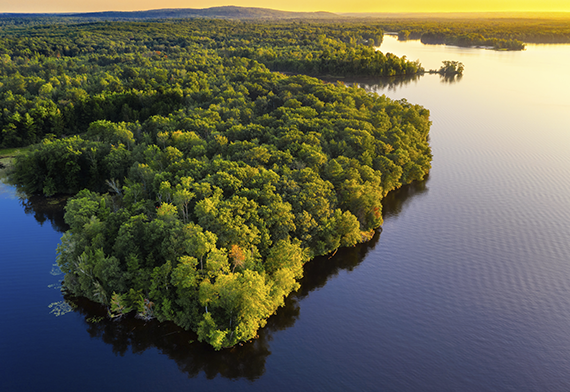With the right support and investment, the PCI strategy can
produce 6 Gt/CO2 of emission reductions and removals by 2030


Since it was launched at the COP26 in 2015, the PCI Strategy of the State of Mato Grosso has mobilized partners and investments that directly support the implementation of its goals.
Some of the most relevant initiatives operating in the State and which contribute positively to the PCI are:
In 2023, the MT Productive Program (or MT Produtivo”) was approved by the Legislative Assembly of Mato Grosso and the World Bank. The program is a loan of USD 80 million with a counterpart of USD 20 million from the state of Mato Grosso to support family farming in the region. The Secretary of Family Farming (of “SEAF”) will be responsible for executing the loan, which will aim to support the strengthening of approximately 16 thousand family producers, combined with environmental and land regularization. Hence, the MT Produtivo program contributes to the goals of the PCI “Include” axis.
Learn more:https://www.agriculturafamiliar.mt.gov.br/cadeias-produtivas
Since 2009, the IDH has been operating in Brazil developing programs in the soy, cotton, coffee and wood production chains. As of 2015, the program started to focus on the territorial approach. The IDH landscape program is an integrated approach to production, protection and inclusion for sustainable natural management in its regions of operation. In Mato Grosso, the program focuses on supporting the state’s PCI Strategy, forming PCI Regional Compacts and co-financing projects with the private sector in relevant value chains.
Learn more: https://www.idhsustainabletrade.com/landscapes/mato-grosso-brazil/
In 2012, the German government through the Federal Ministry of Economic Cooperation and Development (BMZ) established the Global REDD Early Movers Program (REM). Th program provides support to countries and states that have implemented pioneering initiatives in forest conservation and reducing emissions from deforestation and degradation.
Launched at the Rio+20 Conference in June 2012, the REDD Early Movers Program (REM) is an innovative initiative that rewards pioneers in forest conservation and climate change mitigation. It is aimed at countries or subnational jurisdictions that have developed initiatives to protect forests and/or reduce emissions from deforestation and degradation.
The Program provides results-based payments for reducing verified emissions from deforestation, thus becoming a REDD initiative, in accordance with the decisions made in the United Nations Framework Convention on Climate Change (UNFCCC).
The actions of the REM Program contribute directly to the goals of the PCI strategy, including funding for structuring and strengthening the PCI Institute. The phase 2 of the REM program is scheduled to begin in 2024, when a further EUR 30 million will be allocated to continue the program until 2029.
Learn more: https://remmt.com.br/index.php/pt/
The Partnership for Action for a Green Economy - PAGE - supports countries interested in advancing towards more inclusive economies, which seek to use resources efficiently and with low carbon emissions. In 2012, the final document of the United Nations Conference on Sustainable Development Rio+20 - "The future we want", recognized the Green Economy as a channel for the promotion of sustainable development and the eradication of poverty. At the time, there was a call for the United Nations to support countries interested in the transition to greener and more inclusive economies. In response to this call, five UN agencies: UNIDO, UNEP, ILO, UNDP and UNITAR - created PAGE - Partnership for Action for a Green Economy, with the objective of meeting the growing demands of countries that seek to develop and implement Green Economy strategies in their territory. The Green Economy is one that results in the improvement of human well-being and social equality, while significantly reducing environmental risks and ecological imbalances. After the launch of the PCI Strategy - Produce, Conserve and Include, in December/2015, at COP 21 in Paris, the State of Mato Grosso in 2016, through Decree No. 739 of 11/10/2016, signed a partnership with PAGE and the program was started with the objective of contributing to the equitable and sustainable transformation of economic structures aiming to achieve environmental sustainability, create decent jobs, reduce poverty and improve human well-being. Mato Grosso was the first subnational state in the world to receive support from PAGE.
Learn more: https://www.un-page.org/news-events/news/brazil-mato-grosso-state-news
In 2019, the state of Mato Grosso received a USD 250 million loan to regain fiscal sustainability and increase institutional capacity for sustainable agriculture, forest conservation and mitigation of climate change. The program supports fiscal sustainability policies and management of economic growth based on “nature-based solutions” for environmental protection and mitigation of climate change in the state.
Learn more: https://projects.worldbank.org/en/projects-operations/project-detail/P164588
Ensuing the support initiated by GIZ in 2017, a new technical consultancy commitment was agreed during the bilateral negotiations in November 2019 in Bonn (Germany) to assist in the implementation of the REDD+ for Early Movers Program with a focus on strengthening the PCI’s inclusion goals the project has financed activities from 2021 to 2023.
Learn more: https://www.giz.de/en/worldwide/12055.html
O Projeto Trajetórias de Descarbonização auxilia governos estaduais e regionais a desenvolver um processo ou caminho de transformação para reduzir emissões. A trajetória proporciona uma escolha a governos estaduais e regionais, de modo que eles possam tomar decisões informadas sobre a melhor forma de reduzir emissões enquanto apoiam o desenvolvimento econômico e social. Mato Grosso é membro do GCF e Under2 Coalition, e através da SEMA-MT o projeto está em andamento no Estado.
Saiba mais em: https://www.theclimategroup.org/climate-pathway-project
Coordinated by CIRAD (Agricultural Research Center for International Development) in partnership with ONF-International and AVSF (Agronomists and veterinarians without borders), and with the financial support of AFD, the project aims to develop tools for territorial engineering capable of allowing planning and sustainable management in the territories in which it operates. In addition, transition indicators will be built during the project and will allow for the monitoring of the spatial dynamics related to land use. In Cotriguaçu, the project will be conducted by ONF Brazil and will aim to provide the municipality with a tool to control deforestation in addition to enabling agro-ecological practices. A group of pilot farms will also be set up to carry out training workshops to be held with the Life Center Institute (ICV), a partner of ONF Brazil.
Learn more: https://www.afd.fr/en/actualites/communique-de-presse/terramaz-new-partnership-reconcile-fight-against-deforestation-development-amazonia
The project aims to mitigate greenhouse gas (GHG) emissions and increase the income of small and medium producers in the Cerrado (Brazilian Savannah) biome, promoting the adoption of low carbon production technologies. The project has resources from the United Kingdom through the IDB and the Brazilian Ministry of Agriculture (MAPA) and is executed by the IABS and iLPF network. The program seeks to implement activities that improve producers' access to technical assistance, training and credit, as well as actions to strengthen local productive organizations, in order to promote the commercialization of the agricultural production. In addition, it will improve the capacities of local technical assistance service providers (institutions and individual professionals) to work with low-carbon technologies. Such objectives will be achieved by supporting the adoption of crop-livestock-forest integration systems (ILPF) and the recovery of degraded pastures.
Learn more: https://www.ruralsustentavel.org/
The project aims to expand the territorial approach of the PCI strategy in the western region of Mato Grosso through incentives for sustainable soy production combined with long-term social and economic benefits. The project will operate in the municipalities of Sapezal, Tangará da Serra, Campos de Julio, Campo Novo do Parecis, Diamantino, and Alto Paraguai through technical assistance in rural soybean establishments following the guidelines of Produzindo Certo. New CONSERV contracts will also be carried out on 4,000 hectares and 135 hectares of forest restoration in permanent protection areas of small properties. The project is led by the Amazon Environmental Research Institute (IPAM) in partnership with the PCI Institute, Produzindo Certo, and Proforest through funding from the Land Innovation Fund (LIF), Consumer Goods Forum (CGF), and Soft Commodities Forum (SCF).
created with
Joomla Page Builder.

